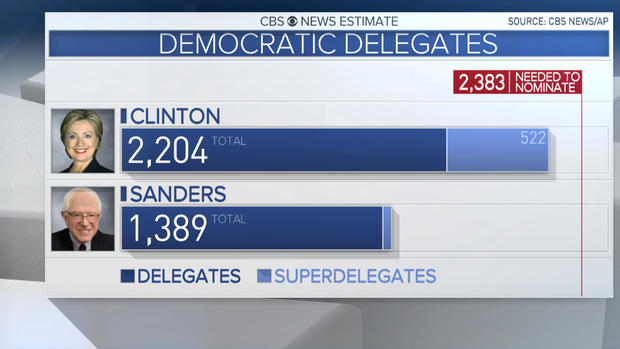2016 by the numbers: Hillary Clinton vs. Donald Trump?
In the wake of the Indiana primary, with Ted Cruz and John Kasich dropping their presidential bids, the 2016 Republican race has been decided: Donald Trump is the likely GOP nominee.
And on the Democratic side, despite a narrow loss for Hillary Clinton in the Hoosier State, the delegate math still makes it a near-impossible task for Bernie Sanders to win the nomination.
Thus, barring some unforeseen calamity, the battle lines of the general election have been drawn: Clinton vs. Trump.
Wait - Are the primaries over?
First, a quick note on last night's results, and the race for delegates in both parties.
CBS News estimates that Donald Trump has picked up all of Indiana's 57 delegates, bringing his total to 1,052. He now needs only 185 additional delegates to reach the magic number he needs - 1,237 - to win the nomination on the first ballot. Last night's results put him on a trajectory to do just that, either on or before June 7, when the last GOP primaries will be held.
In the Democratic race, CBS News estimates Sanders gathered at least 43 of Indiana's 83 delegates, bringing his total to 1,389, while Clinton won at least 37, bringing her total to 2,204.
Clinton now has 92 percent of the 2,383 delegates needed to win the nomination; she needs just 179 more to put her over the top. She and Sanders could split the remaining pledged delegates in the primaries, and she would clinch by June, when California, New Jersey, and several other states vote.
For Sanders to win the nomination, by contrast, he would have to win 85 percent of the remaining pledged delegates, plus he'd have to either win the support of all the outstanding superdelegates, or persuade some superdelegates who are currently supporting Clinton to support him instead.
Even discounting the superdelegates, who are not bound to support the winner of their state's primary, it would be nearly impossible for Sanders to win a majority of pledged delegates - an outcome he'd surely need if he hopes to persuade Clinton-aligned superdelegates to switch their allegiance. With 1,350 pledged delegates to Clinton's 1,682, Sanders would need to win over two-thirds of the remaining pledged delegates to earn a majority. Clinton could lose every remaining contest by wide double-digit margins, and still earn a pledged delegate majority.
Clinton vs. Trump
As for the general election, early national and swing state polls show Clinton with a fairly sizable lead over Trump. She's not exactly a picture of popularity, however: both she and Trump have the lowest favorability ratings of any major party presidential candidate in the last few decades, though Trump's are decidedly worse.
A CNN/ORC poll released Wednesday showed Clinton ahead of Trump nationwide, 54 to 41 percent, a result that's roughly in line with other recent polls. A Suffolk/USA Today poll from the end of last month found Clinton up 11 points, 50 to 39 percent. And a CBS News poll from mid-April showed Clinton ahead of Trump, 50 to 40 percent.
General election polling of swing states hasn't been too copious - you can expect that to change, and quickly - but early surveys show Clinton with a lead in some key states that will decide who wins the Electoral College. An NBC/WSJ/Marist poll taken last month showed Clinton with a wide lead in Pennsylvania, claiming 54 to Trump's 39 percent. In Ohio, a survey from the same pollster in March showed Clinton ahead of Trump in Ohio, 48 to 42 percent. And that same March survey showed Clinton ahead of Trump in Florida as well, 49 to 41 percent.
Before the general election horserace kicks into overdrive, though, it's worth pausing to marvel at the peculiar situation in which we find ourselves: Trump and Clinton may be popular enough in their respective parties to win the nomination, but they are perhaps the two most unpopular, polarizing figures on the political stage today.
In a CBS News poll in March, only 24 percent of respondents said they view Trump favorably, while 57 percent said they view him unfavorably - a net favorability rating of negative 33. It's likely that number will improve, as Trump's primary rivals exit the stage and the party begins to unify behind his candidacy. How much it will improve may be the pivotal question of the 2016 race.
Clinton's numbers are slightly better than Trump's, but not much: 31 percent of respondents told CBS News they view her favorably, while 52 percent said they view her unfavorably - a net favorability rating of negative 21. As with Trump, you can expect Clinton's numbers to improve if and when Sanders bows out of the race.
The bottom line: Don't expect a popularity contest to dominate the narrative this fall. In all likelihood, we're in for an ugly, combative election, with each candidate doing less to hype themselves and doing more to demolish the other - driving up negatives and ultimately disqualifying their opponent in the eyes of just enough voters to pull an messy victory from the dumpster fire.
